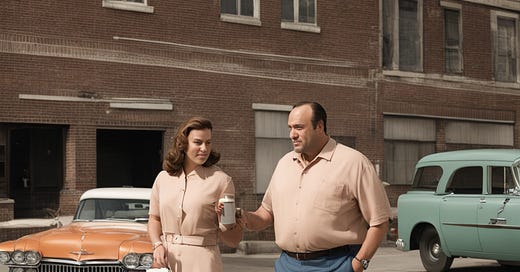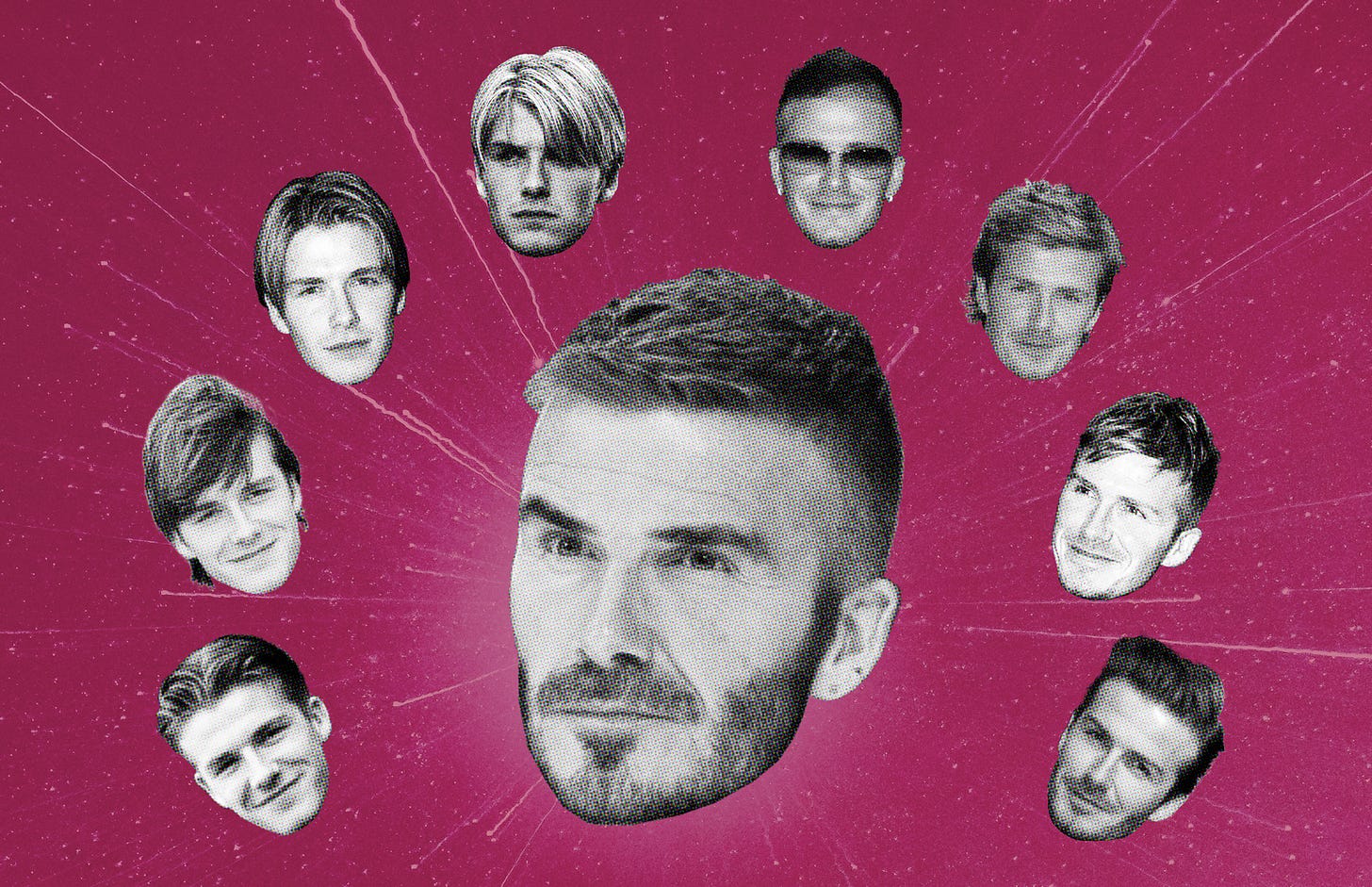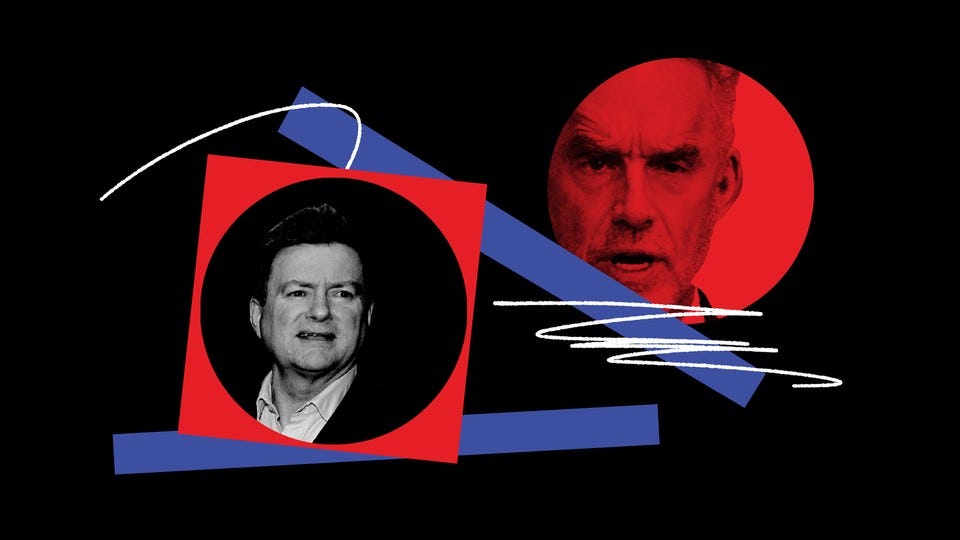Happy Friday!
In this week’s newsletter you’ll find David Beckham, Jesse Armstrong and Jordan Peterson. (One hell of a supergroup.) I have now started reading the full text of Nadine Dorries’s The Plot, but you can get a sense of my reaction to the initial extracts—wailing, gnashing of teeth, that sort of thing—on the latest Private Eye podcast.
Helen
David Beckham: A Man in Full (The Free Press, Substack)
Beckham, the four-part series, finds the athlete looking slightly weathered (albeit still in the 99th percentile for handsomeness) and sporting a sort of coastal grandfather aesthetic; the tiny tighty-whities have been replaced by cable-knit sweaters, and he’s got a stubbly salt-and-pepper beard. He also has a gifted and sympathetic interlocutor in director Fisher Stevens, who traces the evolution of Beckham’s 20-year career through four countries, six premier league titles, two MLS championships, and three World Cups—including the one in 1998 where he got red-carded for impetuously kicking at an Argentine player (who, in classic soccer style, went down like a sack of potatoes even though he’d barely been grazed). The trajectory of Beckham the footballer is also inextricably linked with his personal life, including his relationship with his wife, Victoria, with whom he has four children.
But while Victoria gets her share of screen time, this is ultimately a story about men, and manhood—and most fascinating, it’s about how to be a good guy in a world where the word masculinity is often preceded by the word toxic. Fisher sits down not just with Beckham but also with multiple other star athletes of the era, his teammates and rivals and friends.
Kat Rosenfeld enjoyed Netflix’s Beckham documentary as much as I did. (Once I got past the fact it’s a total PR job for him, to the extent of silently editing a front page about Rebecca Loos to pretend his unconvincing denial was the first paragraph.)
The documentary brought out a strand of 90s culture that I was only dimly aware of at the time: how much of the hatred against David Beckham was driven by his perceived unmanliness. The haircuts, the beauty, the sarong, the emotions. Tied in with that is a very 90s word: pussy-whipped. There was an uneasiness over the idea that Posh had a career, too—maybe even one that was more prestigious and better-paid than Becks’. Alex Ferguson clearly wanted him to settle down with a meek housewife and dedicate himself entirely to Manchester United. People seem to have been horrified by the suggestion he might have prioritised the birth of his child over a Champions League qualifier. Some of the press at the time now reads like an attempt to bully him for the crime of being pretty and having a high voice.
Who Runs The Show? (New Statesman, payfence)
[P]erhaps the most damaging myth that lives in the bones of this book is the Difficult Men hypothesis. Difficult Men, a 2013 survey of the big male-led cable shows of the early 2000s by Brett Martin, which Biskind acknowledges warmly, may be the book he would have preferred to have written had it not already existed. But while Martin burrowed deep into the creation of The Wire and The Sopranos, he remained ambivalent and forensic in describing the complicated figures who made those breakthrough cable shows.
Biskind’s take is less ambivalent: he gives us the sense that these are the guys who can really do it. That it is not a quirk of history that some Difficult Men made some great television, but that there is a link between the hard-driving, self-loathing, capricious, sometimes dictatorial approaches that some of that generation took and the quality of the shows.
This muddles correlation with causation. Making a big TV show, and making it good, is always going to involve some friction and pain. But it’s not the friction and pain that make it good. If you think it is, you are in danger of venerating the difficult and painful parts, rather than seeking to ameliorate and address them.
Jesse Armstrong reviews a book about the era of prestige television—and reflects on one of my favourite themes: do arseholes make better work than nice people?
Is There More to Conservatism Than Mocking ‘Wokeness’ on YouTube? (The Atlantic)
One of ARC’s backers is the hedge-fund manager Sir Paul Marshall, who in less than a decade has built a media-influence machine to rival that of Rupert Murdoch, but with far less fuss and far less resistance. Marshall controls a British cable-news channel and a magazine, and might soon have a newspaper. But his empire is torn between two impulses—and so is conservatism as a whole, on both sides of the Atlantic. Like some in the Republican Party, the Marshall Empire—and the ARC—wants to be associated with conscientious capitalism and living a moral life. Yet the quickest route to getting attention on the right is through complaints, cheap jokes, and conspiracism.
ARC’s other two public faces are Philippa Stroud, from a pro-Brexit think tank called the Legatum Institute, and the Canadian psychologist Jordan Peterson. Baroness Stroud chaired several sessions, looking aristocratic in a pearl necklace, a pearl headband, and pearl earrings, while Peterson wore some of his most preposterous personalized suits, including one that made him look like Two-Face in Batman. Stroud and Peterson neatly embody the dilemma: Which does modern conservatism care about more—sincere attachment to family, faith, and flag, or wailing about “wokeness” for the algorithm? Hell, Peterson symbolizes the division all by himself. In the course of five years reporting on him, I have identified two types of Peterson fans: people who love his books, and people who love his social-media posts. The books are self-help tinged with mysticism and philosophy. The posts are pronouncements such as “Blame the Faculties of MisEducation For all this Postmodern neoMarxism” and “Never never buy a vehicle with Intelligent Speed Assistance.”
I went to the ARC conference and all I got was . . . to overhear people argue about Donatism and William of Ockham. It was a much more serious and intellectually engaged crowd than NatCon, held earlier this year, but at the fringes, the Intellectual Dark Web were hovering.
Quick Links
This Alex Massie essay made me want to go deer-stalking, which is not a feeling I’ve had before (Debatable Land, Substack)
“While Ray traveled the world spreading the gospel of Big Macs and french fries, Joan developed into a prodigious if idiosyncratic philanthropist.” Twenty years ago, Joan Kroc’s bequest single-handedly assured the continuation of the U.S. public service radio station NPR. Here are more details on the story, which I coverede in Episode 4 of the second series of Great Wives (Washington Post, £).
“I fully expect Labour to use this line again and again. You’re going to be bored of hearing it. Labour shouldn’t be able to use it, because it shouldn’t exist. And the reason it exists is that the Prime Minister went on stage with a tech billionaire, and was more interested in finding ways to agree with him than in making sure he sounded like someone who understands how people who aren’t tech billionaires think.” Tom Hamilton has a Substack! (He used to do oppo research for Labour, and prep Ed Miliband for PMQs, but don’t hold that against him.) Here he is writing about the problem with Rishi Sunak’s interview with Elon Musk (Dividing Lines).
Following my last email about women and badly fitting protective equipment, the CEO of the Women’s Engineering Society got in touch to say they’re running a survey. Do fill it in if it’s relevant to your job.
Craig Raine once wrote a poem about a bumhole and I strongly urge you not to read it over breakfast (Genius).
See you next time!






That Craig Raine poem went down very badly in my recent best man's speech
Further to the Jesse Armstrong piece, There’s a great book called Why Do So Many Incompetent Men Become Leaders? (And How to Fix It) by Tomas Chamorro-Premuzic, which (if you haven’t read it already), I think you’d enjoy.